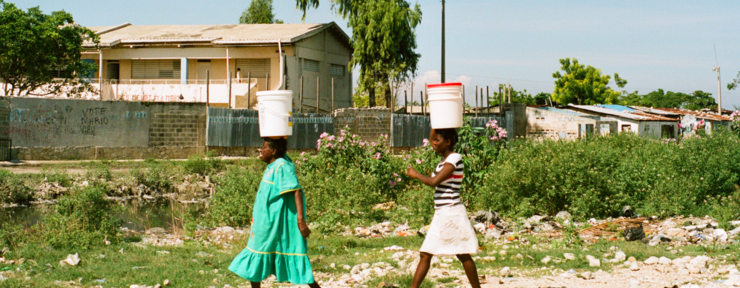
A Talk with Founder Faith Wallace-Gadsden
The Archimedes Project is holding a kickoff event November 1-3 at Impact Hub Boston and Cambridge Innovation Center that will bring together people from several sectors – including technology, health, disaster relief, and academia – to form a social enterprise aimed at eliminating cholera in Haiti.
There have been over 8,000 deaths from cholera since the recent widespread outbreak began in 2010. Archimedes Project founder Faith Wallace notes that, while many interventions have been successful in reducing the number of infections and deaths, the disease has yet to be eliminated from Haiti. Without a stronger response, the epidemic is likely to persist.
“Conditions are perfect for cholera: 80 percent of the people lack sanitation coverage in Haiti, and 50 percent lack access to clean water. If nothing changes to treat the problem, the disease will continue to devastate Haiti as a yearly endemic as it has Bangladesh.”
We interviewed Faith Wallace to learn more about why she started the Archimedes Project and to invite her to share her firsthand experiences seeing the effects of cholera in Haiti.
What inspired you to form the Archimedes Project and combat cholera in Haiti? Can you share any anecdotes regarding the situation in Haiti you are trying to combat?
I was inspired in large part by the work I was already doing. I am a PhD candidate in molecular microbiology at Tufts Medical School studying cholera, and my research area has long been in diarrhea disease because it is a leading killer of children under the age of five. My work first centered on understanding the specific mechanisms that diarrhea-causing E. coli use to resist killing by antibiotics. My doctoral work focused on understanding the molecular basis of the rapid spread of cholera.
In October 2010, Haiti experienced a cholera outbreak. Within two weeks of the outbreak, I had established a collaboration with Saint Nicola Hospital in Saint Marc, the hospital at the epicenter of the outbreak, to collect patient samples. When I arrived in Haiti, I found a country still deeply scarred by the January 2010 earthquake: displaced people filled the squares and streets of Port-au-Prince. Destroyed buildings were everywhere. And people were dealing with a new horror: cholera.
What I also found was commerce. I found men selling bottles of water and SIM cards in the street, women selling fruits in the markets, children in their uniforms going to school. I also found an international community completely incapable of coordinating the hundreds of foreign aid workers trying to stop the cholera outbreak.
Many attempts have been made to combat cholera in Haiti and they have been largely unsuccessful. Why do you think that is?
The efforts to combat cholera in Haiti have been successful. The number of cases has been drastically reduced, as have the number of deaths. What they haven’t done is eliminate the disease from the country.
Originally, I started my graduate work in cholera molecular biology because I thought that a treatment or a vaccine could have the most positive impact. I went to Haiti and saw them try to fight the spread of cholera with the simplest intervention: the chlorine tablet. Seeing that effort fail showed me it is not about the intervention; it is about distribution. How do you get even the most basic technology to 10 million people?
From then on I soaked myself in information about the most successful large-scale interventions in water. Water is a local issue in so many ways. It is also a regional and community issue. You can treat your water in your own house, but at the end of the day you and especially your children are going to get water somewhere other than your house, and when you do, if your neighbors and your neighbors’ neighbors aren't treating their water, you are at risk of infection.
For me, there was a disconnect: an international community unable to get chlorine tablets to every household and a populace not only wanting a solution but also eager to work. I realized people want to work, and people want water. People in Haiti pay for water, not only directly in cash, but also indirectly in time, lost work, missed school, poor health, and, when there is cholera, in death. I began to ask if it was possible to marry the need for work with the need for clean water.
How do you think technology can play a successful role in the response to cholera? Are there technologies you are eager to see deployed?
What became clear to me is that the programs that seem to work the best have an internally-driven component. The strongest motive is an economic motive. That’s what got me thinking, “Well, we have technologies that work and a need for profit in a place where the economy is suffering in part from this problem. Why not try to use technology both to protect people from this disease and to help them build a better economy?”
The technologies that interest me most are ones that are practical, scalable, and actually work. I did recently learn about electrochlorinators − systems that use an electric current to disinfect water − and am interested in including them in the project. They are low cost, simple to use, and easy to deploy in a big way. Paul Polak’s Spring Health has deployed them in India in an exciting way. In Haiti, one of our technology partners, Antenne, has an electrochlorinator called the WATA that has been deployed in Haiti. I'm interested to seeing if any of the teams pick up that technology in their plans.
Describe the Archimedes Project and your November kickoff event. How do you think this event can contribute to improving the situation in Haiti?
The Archimedes Project will bring together 50 people from across business, non-profit, academic, and government sectors for a collaborative event that will design an actionable and scalable water or sanitation social business driven by local entrepreneurs. With the advice of the experts who understand water and sanitation, who understand Haiti, who understand business, these young professionals and students will come up with plans that could be launched in Haiti.
We will then actually launch them in collaboration with our partners. We are going to design a large-scale system over the course of the weekend. Over the following days, weeks and months, we will launch that program: first in one location, then across the country. The goal is to be on the ground, operating, finding out what works, adjusting the plan and scaling within one year.
What sort of projects or initiatives do you hope will emerge from the event?
The goal of the Archimedes Project is to produce a large-scale clean water social enterprise in Haiti that uses low-energy technology. It will be a micro-enterprise or micro-franchise and piloted with an experienced on-the-ground partner. The nature of the plan will be determined by the groups and will depend on their ideas and experiences.
Are you currently partnering with any NGOs or government agencies in Haiti? What are the goals of these partnerships?
Yes. We are very luck to have many Haitian partners. We have partners who work in water and sanitation and are acting as advisors to the project. These organizations have worked in the water or sanitation space in Haiti and have a deep knowledge of the topic. We are thrilled that two organizations − Safe Water Haiti and Pure Water for the World − are sending their directors to join us in November!
We are also partnering with organizations that have a strong and longstanding presence in a community. They will advise teams during the event and will support us as we pilot the plan that comes out of the Archimedes Project.
As for the goals of these partnerships, an important aspect of the Archimedes Project is the Lean Startup model of quickly implementing a plan in order to find out what works and what doesn't. It is our goal to get on the ground as quickly as possible and start finding out what elements we come up with in Boston will translate in Haiti and what won’t. From there we can iterate and scale.
Having partners all over the country will allow us to form nucleii from which we can build. We will be thinking globally but acting locally, recognizing that each region may have specific characteristics that we will have to be flexible enough to address. We are so excited to get started!
Have an idea for the Archimedes Project? Want to participate? Tweet to them @ArchGrp to learn more and help share their story.

